
Guests
- Peter Kornbluhsenior analyst at the National Security Archive, a public-interest documentation center in Washington. Peter directs the Cuba and Chile Documentation Projects.
Weeks after a U.S. judge released Posada Carriles on bail, Peter Kornbluh of the National Security Archive reveals that new evidence has surfaced linking Posada Carriles to a string of terrorist attacks. Posada Carriles goes on trial this week in Texas — for immigration fraud, not terrorism. [includes rush transcript]
Transcript
AMY GOODMAN: The anti-Castro Cuban militant and former CIA operative Luis Posada Carriles is set to stand trial in El Paso Friday. Posada is linked to a series of deadly attacks, including the 1976 bombing of a Cuban airliner that killed all 73 people on board. But in a move decried around the world, Posada will not be standing trial for terrorism — instead, for an immigration infraction, accused of lying to U.S. authorities when he came into the country two years ago. The Bush administration has refused to extradite Posada to Cuba or Venezuela, saying he would face torture.
Well, there are several new developments in Posada’s case. Authorities have filed documents showing the FBI believes Posada plotted a series of deadly bombings in Cuba in the 1990s. Meanwhile, both Posada and the U.S. government are trying to disqualify potentially damaging evidence from his trial. Defense attorneys have filed a motion to omit Posada’s statements from a 2006 interview with immigration officials. For their part, government prosecutors have filed a motion to effectively bar Posada from discussing his ties with the CIA. Former President George H.W. Bush headed the CIA at the time of the October 1976 bombing of the Cubana airliner that killed 73 people.
These developments come as the public interest documentation center, the National Security Archive, has released new information further linking Posada to that attack. For more, we go now to Washington, D.C., where I’m joined by Peter Kornbluh, senior analyst at the National Security Archive, where he directs the Cuba and Chile Documentation Projects. Good to have you with us, Peter.
PETER KORNBLUH: Good morning, Amy.
AMY GOODMAN: Peter, start with this new document that you have just posted on your website, a handwritten document believed to be Posada’s.
PETER KORNBLUH: Well, this is a document that was written by an employee of Luis Posada’s, a man named Hernan Ricardo Lozano. Ricardo was actually convicted of actually placing a bomb on this plane, but he clearly did so at the behest of Luis Posada and another anti-Castro terrorist, Orlando Bosch. We have declassified FBI and CIA documents based on confidential sources in Venezuela that said that Posada engineered the bombing of the Cubana flight on October 6, 1976.
But now we have what can be called a scouting report on targets for terrorism that Posada’s employee Hernan Ricardo wrote by hand and that was found by Venezuelan investigators, according to my sources in Posada’s office, after the plane went down. This is a report that basically details all of the potential sites for terrorism in Trinidad, in Panama City, in Bogota, Colombia and elsewhere that had links to Cuba. It was a report that appears to have been written in the late spring or very early summer of 1976. For example, it starts with a paragraph on Barbados, and it says, and I’m quoting, “On the island of Barbados, there exists only one place with a link to Cuba, and that place is in downtown Bridgetown and is the office of the airline BWIA, British West Indian Airways.” And then, on July 14, 1976, this office of BWIA was struck by two bombs.
This scouting report also details the plane schedule of Cubana airline flights in and out of Barbados, even identifying the plane that would fly in on Wednesdays from Trinidad and then fly out to Jamaica and onto Cuba, originating, that flight, in Venezuela. That was the flight on October 6, 1976, that was brought down by a bomb on the plane.
AMY GOODMAN: Now, why is information just coming out now — I mean, especially from Venezuela, which has wanted Posada extradited for years?
PETER KORNBLUH: Well, you know, legal documents in various investigations sometimes are under court seal. They’re very difficult to get. These are documents that I have been trying to get for well over a year now. There exists a rich body of international evidence on the bombing of Cubana Flight 455. This is evidence that was gathered in Trinidad, when Hernan Ricardo and his accomplice Freddy Lugo were arrested after the plane was blown up, evidence generated by Cuban investigators, evidence that was presented to a commission in Barbados, and declassified U.S. intelligence documents, which were generated by the bombing, as well.
And all of this evidence is not only immediately relevant to a discussion of Posada’s guilt and the issue of bringing him to justice for the bombing of this plane, but it’s also relevant to investigators looking at the whole issue of how major jets can be brought down by liquid explosives. In this case, we had Posada engineering a bomb, apparently, that was a C4 explosive stuffed into a Colgate toothpaste tube. And so, this could not be more relevant to the issue of detecting and deterring the use of liquids and gels today on planes that pose a threat to innocent civilians traveling abroad.
AMY GOODMAN: Now, what about the role of the CIA and whether or not this is going to come out in any way in, not this terrorism trial, but in this trial for an immigration infraction?
PETER KORNBLUH: There’s no immediate evidence that the CIA was involved in the bombing of the Cubana flight. But Posada had been a CIA operative in the '60s and into the ’70s. And the U.S. attorneys who are trying to prosecute him now on immigration fraud charges basically may have two motivations. The most benign motivation for them trying to suppress evidence of his involvement with the CIA and his ability to bring this up at trial is that they don't want him to muddy the waters, saying that he was trained to come into the country illegally, you know, in and out of the United States illegally, using false passports by the CIA, and he was just continuing on with that type of training. They want to have a pure effort to, I think, convict him and hold him for as long as possible on these charges.
The more sinister interpretation could be that they believe that there’s still very significant secrets about his role with the CIA. He certainly told the people that worked for him in 1976 that he was still a CIA operative. They believed he was. And the CIA wants to protect the secrets of the past, the sinister secrets of multiple attempts on Castro’s life, on efforts to undermine and overthrow the Cuban government — dark and murky and violent, dangerous, and a shadowy history that Posada was obviously in the center of.
AMY GOODMAN: Peter Kornbluh, we have to break, but when we come back, I also want to ask you about the FBI going to Cuba to investigate, gather evidence around the issue of terrorism and Posada’s connection to it, and also ask about the U.S. congressmembers, the politicians who are trying to stop this. We’re talking to Peter Kornbluh, directs the Cuban and Chile Documentation Projects at the National Security Archive. And after we finish with Peter, we will be joined by a father and daughter. Max Lesnik was close to Fidel Castro, then split with him, came to the United States. Now, his daughter Vivien Lesnik has done a film about him called The Man of Two Havanas. Luis Posada is also a central player in Max Lesnik’s life and mission right now in the United States. We’ll be back in a minute.
[break]
AMY GOODMAN: We continue with Peter Kornbluh, senior analyst at the National Security Archive. Can you talk about the FBI going to Cuba and U.S. congressmembers’ response to this?
PETER KORNBLUH: The FBI recently went to Cuba to gather evidence about Posada’s role in a series of bombings of hotels, tourist hotels, in 1997. One Italian businessman was killed, 11 people were injured, as bomb after bomb went off in the lobbies of major hotels and other tourist sites like discotheques at that point. Posada is actually under investigation for this now, and a grand jury in New Jersey is weighing evidence of his orchestration of these crimes, as well as his financiers in the New Jersey area actually providing him money to undertake these acts of terrorism.
And the FBI’s visit to Cuba is extremely important. It would be the third time since 1998 that the FBI has been to Cuba to hold discussions with the Cuban authorities about terrorism and evidence of exile terrorism going on in the United States, Cuban Americans being involved in planning terrorism against Cuba from the territory of the United States itself. The first time that they went, the FBI went in 1998, the Cubans gave them papers and evidence of plots that were being planned, but instead of rounding up those people planning these acts of terrorism, the FBI rounded up a team of Cuban spies who were operating in Florida and spying mostly on Cuban exile groups, such as the groups that have been tied to Posada in the past. And those men were rounded up. Five of them are in jail now, serving long sentences for conspiracy to commit espionage. I write about them in the current issue of The Nation magazine, in case anybody would like to follow up, but —
AMY GOODMAN: Peter, in that piece, “Terror and the Counterterrorists,” you begin by talking about the Ibero-American summit that took place in Panama, November 17, 2000, which links to this and also links to Posada. Explain what happened.
PETER KORNBLUH: Yes, well, Luis Posada knew that Fidel Castro was going to be speaking in Panama City in November of 2000. He rounded up a team of co-conspirators, including Guillermo Novo, who was involved in an assassination of Orlando Letelier and Ronni Moffitt in Washington in September of 1976. They went into Panama City, but their assassination mission had been intercepted by Cuban intelligence by very similar spies operating in the exile groups in the United States, and this intelligence on this operation, which included, by the way, 33 pounds of C4 explosives that Posada was apparently going to use to blow up the auditorium that Fidel Castro was going to be speaking in in November of 2000.
Fidel Castro arrived in Panama City. He used this intelligence to hold a press conference. He said, “I’m not the only one here. Luis Posada is here. And Cuban authorities provided videotape and intercepts and other intelligence to the Panamanian authorities, and they arrested Posada at a downtown hotel. They found a gym bag filled with C4 explosives. And eventually, he and his co-conspirators were prosecuted and convicted of a lesser crime of endangering public safety.
But this goes to show you, you know, that gathering intelligence does save lives, does stop terrorist attacks. Just like the CIA is now attempting to penetrate al-Qaeda cells, the Cuban intelligence has for years been attempting to penetrate and gain intelligence on exile groups with proven track records of violent acts against Cuba and other civilians.
But now we have a situation where the FBI is obviously working again with the Cuban authorities to gather information on the hotel bombings, and if Luis Posada is actually indicted in New Jersey, and other co-conspirators from the New Jersey area, of funding and conducting these attacks against the hotels, I do believe that this will be a very, very important statement by the Justice Department to bring terrorists to justice, frankly, and could be a turning point in the history of U.S.-Cuban relations.
AMY GOODMAN: And the congressmembers who are objecting to the FBI going to Cuba to investigate these charges of terrorism?
PETER KORNBLUH: The Cuban-American delegation in Congress, including Ileana Ross-Lehtinen from the Miami area and Lincoln Diaz-Balart, have now said that this is — they have now condemned the FBI for going to Cuba to gather this evidence. This, frankly, is one of the most outrageous thing that a responsible congressman and congresswoman could say. They basically are trying to politicize an investigation into a series of active international terrorism. They are essentially trying to protect people like Luis Posada from the justice that they deserve. And it seems to me that they, frankly, should be condemned by other members of Congress who recognize that the United States has an interest in pursuing terrorists of whatever political bent and insuring that the United States of America is not used as a territorial base for acts of terrorism against Cuba or any other country.
AMY GOODMAN: Yet right now Luis Posada remains free, was released from jail, is in Miami. What do you predict will happen in this immigration trial, and do you think he will be charged with terrorism?
PETER KORNBLUH: Well, let me just say that I hope that he is charged by a grand jury, indicted by a grand jury on multiple acts of terrorism — in 1997, orchestrating this series of hotel bombings, to which, by the way, he actually admitted to The New York Times he had done. And that is part of the evidence that’s being given to this grand jury.
First, I do believe that he will quickly be prosecuted this Friday and next week for immigration fraud. The evidence that he snuck into this country illegally, that he’s trying to protect the people who actually brought him, is pretty overwhelming. So he did lie. This is obviously a minor infraction, and a judge may just say, “Well, you’ve been in jail for two years, and at age 79 you don’t deserve to be in jail anymore for lying on your immigration forms.”
But — and if he is freed, obviously there’s going to be another international outcry, and fingers will be pointed at the Bush administration for a double standard on the war on terror and even accusations of protecting one of the individuals who, frankly, is at the top — he’s in the top 10 list of international terrorists that are alive today.
AMY GOODMAN: Peter Kornbluh, I want to thank you very much for being with us, senior analyst at the National Security Archive, also was editor of a special issue of The Nation magazine that’s just come out called “Cuba: What’s Next?”

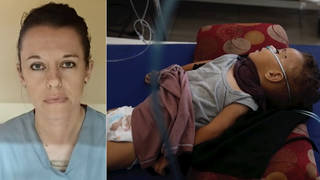
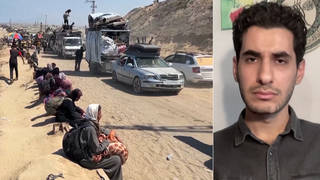
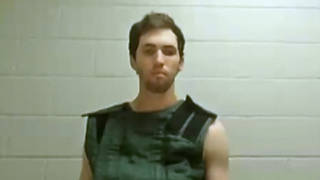
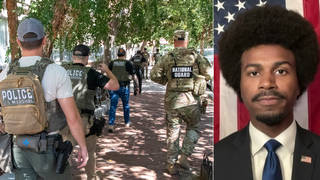






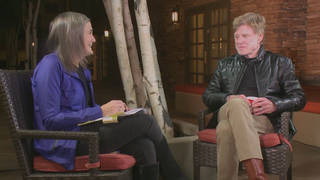
Media Options